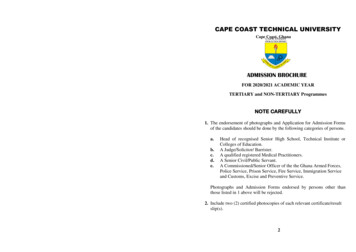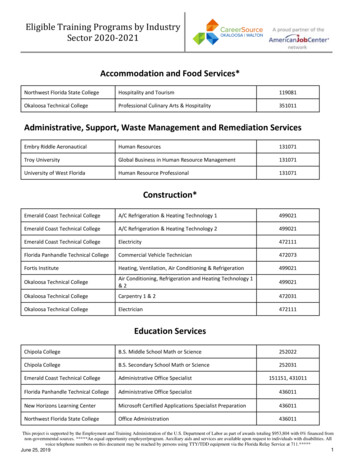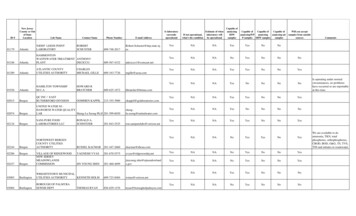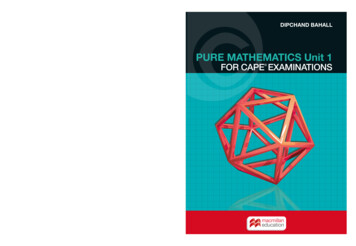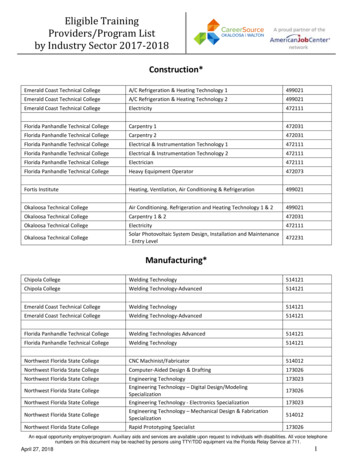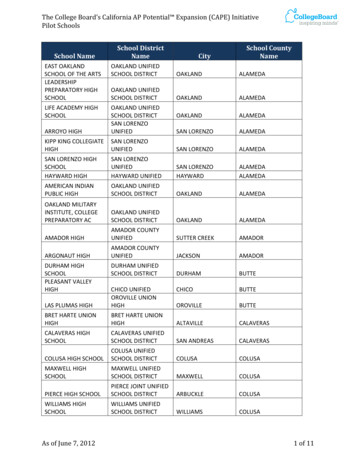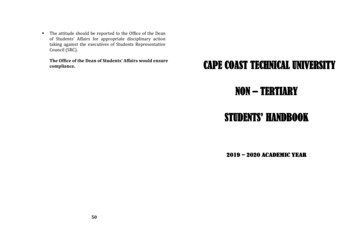
Transcription
The attitude should be reported to the Office of the Deanof Students’ Affairs for appropriate disciplinary actiontaking against the executives of Students RepresentativeCouncil (SRC).The Office of the Dean of Students’ Affairs would ensurecompliance.CAPE COAST TECHNICAL UNIVERSITYNON – TERTIARYSTUDENTS’ HANDBOOK2019 – 2020 ACADEMIC YEAR50
The attitude should be reported to the Office of the Deanof Students’ Affairs for appropriate disciplinary actiontaking against the executives of Students RepresentativeCouncil (SRC).1.0.7NOISE EMANATING FROM OPEN FORUMS / PROGRAMMES BY THESTUDENTS REPRESENTATIVE COUNCIL (SRC)COUNCIL (SRC)It refers to noise emanating from forum or programmes organized by theStudents Representative Council (SRC) on campus such as the long hours ofplaying music before forum or programme commences.The Office of the Dean of Students Affairs would ensurecompliance.a.Disorderly ConductThe following were considered as a disorderly conduct: Playing of music at a high volume prior to commencement of programme. Excessive use of public address systems before, during and after forums orprogrammes causing nuisance to others. Organization of forums or programmes at inconvenient time period. E.g.during working time or late in the night during weekdays and weekends.b.Remedies for Controlling Noise Emanating from Open Forums /Programmes by the Students Representative Council (SRC)The following were considered as remedies for controlling noise fromvehicles: Music should be played for only thirty (30) minutes and at a moderated soundlevel prior to commencement of the forum or programme. Public address systems (PAS) should be used only when the programme isabout to commence and in moderation. Forum or programme should end by 6.00 p.m. on weekdays. 5049
The Personnel of the Security Section should be empoweredto deal with such persons (drivers) who flout the laws onnoise making. Drivers should use a destination boards on top of theirvehicles to inform passengers of their (drivers) destinationsto reduce the noise of hawking for passengers.c.Penalties for Breaching the Remedies The Security Officers should caution the culprit. The Security Personnel should be trained to be vigilant toenable them capture numbers of vehicles of offendingdrivers. Such numbers should then be handed over to theChief Security Officer to track down those offenders forappropriate sanctions.CAPE COAST TECHNICAL UNIVERSITYAll rights reserved. No part of this publication may bereproduced,stored in a retrieved system, or transmitted in any form or byany means, electronics, mechanical, photocopying, recording,or otherwise, without the prior permission of thecopyright owner.For further information, contactThe Vice ChancellorCape Coast Technical UniversityP.O. Box AD 50Cape Coast, Ghana Failure to comply with the first rule, the offenders should bedriven out from the Technical University premises by theSecurity Officers.The Security Officers on duty would ensure compliance.48i
TABLE OF CONTENTSb.CONTENTSPAGEFOREWARD1Scope of HandbookPurpose of HandbookGlossaryRegistration ProcedureGeneral Academic Regulations1.0The Semester Calendar2.0Orientation and Registration3.0Names of Students4.0Admission5.0False Declaration6.0Matriculation7.0ID Cards8.0Student Fees9.0Responsibility for Notices10.0 Attendance Regulation11.0 Policy on Excessive Absence 11.1Academic Counselling12.0 Assessment12.1 Late Examinations13.0 Qualification for taking End-ofSemester Examinations2235667788888899101010ii11Remedies for Controlling Noise Making Emanating fromSurrounding HousesThe Committee noted that since those lands on which the structureswere built does not belong to the Technical University, it wasproposed that: The management of the Technical University should write to the Cape Coast Metropolitan Assembly (CCMA) and they in turn willsensitized and educate bar and entertainment centre operatorsaround the catchment area of the Technical University on the needfor controlling noise making.1.0.6NOISE FROM VEHICLESIt includes noise from vehicles such as playing of music at a high volume,indiscriminate tooting of car and motor bike horns and irritating soundfrom exhaust pipes of cars and motor bikes.a.Disorderly ConductThe following were considered as a disorderly conduct: Playing of music by drivers at a high volume and indiscriminatetooting of car and motor bike horns in and around the campus. Cars and motor bikes with high volume of irritating sound ofexhaust pipes. Hawking for passengers by driversb.Remedies for Controlling Noise from VehiclesThe following were considered as remedies for controlling noise fromvehicles: Security Personnel of the Technical University should be educatedon noise making on campus. Security Personnel should be vigilant on noise making on campus.47
b. Remedies for Controlling Noise Making Emanating from the StudentsHostel Tape recorder speakers and woofers should not be directed throughwindows or doorways and be played at a moderate volume to avoiddisturbance of other neighbouring students and peace on campus. Students should be considerate to other roommates to ensure conduciveenvironment. Noise should be controlled in the rooms by showing consideration to otherroommates.c. Penalty for Breaching the Remedies The culprit should be giving two (2) caution letters. Failure to comply with the first rule, the culprit should be ejected from thehostel if he or she is a resident. Non-residents should be prohibited fromentering the premise of the hostel.The Hall Warden, Potters and Security Officers on duty would liaisewith the Office of the Dean of Students’ Affairs to ensure compliance.1.0.5 NOISE EMANATING FROM SURROUNDING HOUSESIt includes noise emanating from surrounding houses such as drinking barsand entertainment centres within the catchment area of the TechnicalUniversity.a. Disorderly ConductThe following was considered as a disorderly conduct: Playing of music by use of large PA systems at a high volume by theentertainment centres and drinking bars/spots during the working hourswithin the Technical University.46CONTENTSPAGECOMPONENTS OF PROGRAMMES OF STUDYDiploma in Procurement and Materials Management (DPM)Diploma in Electronic Marketing (DEM)Diploma in Public Relations (DPR)Access (Pre-HND)Diploma in Banking Technology & AccountingDiploma in Computerized AccountingDiploma in Business Administration1212131417182225A. Regulations27Academic & Classroom ConductAcademic DishonestyNon-Academic Misconduct:1. Alcoholic Beverages2. Drugs3. Disorderly Conduct4. Hazing5. Damage to Property6. Entry or use of Technical University7. False Information and Record Falsification8. Student Delinquencies9. Stealing10. Gambling11. Safety2728292930303232323232333333B.C.D.E.F.Public Functions within the Technical University34Procession and Demonstration35Communication with Government Ministries and the Press 36Student’s Channel of Communication36S.R.C.37iii
CONTENTSPAGE Students should be educated on the need to comport themselves whileson campus during orientation and matriculation programmes.G. Clubs and SocietiesH. Use of Technical University TransportI. Technical University Committees on whichSRC is Represented3737CODE OF ETHICS38Vacation Arrangements38Special Notice39Cleanliness in the Halls39Furniture39Guest and Students40List of offences and their sanctions40Anti-Noise Making Policy421.0.4 NOISE EMANATING FROM THE STUDENTS HOSTELDefinition of Noise42Noise by Associations such as Religious Groups,42These include noise emanating from occupants of students hostel, hallroommates whose actions and inactions affect the peace ofoccupants/hostelliers.Social Groups and Political Groups42Disorderly Conduct4437 Management should provide signage at the entrance and exits of lecturehalls to educate the students. (E.g. “Lectures in Progress, Do Not Disturb,No Noise” etc.) .c.Penalty for Breaching the RemediesThe attitude should be reported to the Office of the Dean of Students’ Affairsfor appropriate disciplinary action taking against the individual orgroup.(The reporter should have personal information about the culprit (student orgroup) such as name, course, and year of programme to facilitatedisciplinary action).The Office of the Dean of Students’ Affairs would ensure compliance.a.Disorderly ConductNoise emanating from surrounding Houses46The following was considered as a disorderly conduct.Noise from Vehicles47Penalties for Breaching the Remedies48 Act in such a manner as to annoy, disturb, interfere with, obstruct, or beoffensive to others such as playing of music or watching of television at ahigh volume causing nuisance to other neighbouring students disturbingthe peace on campus.Noise emanating from open forums/programmesby the Student Representative Council(SRC)49iv45
c.Penalties for Breaching the Remedies The culprit should be giving two (2) caution letters. The activities of the association or group should be halted for asemester. Failure to adhere to the second rule, the certificate of the associationor group should be revoked for a specified period and the culpritmade to reapply for reinstatement.The Chaplaincy Board and the Office of the Dean of Students’Affairs would liaise to ensure compliance.1.0.3NOISE BY INDIVIDUALS AND CLASS GROUPS, BEFORE, DURINGAND AFTER A LECTUREThese noises emanate from individuals and class groups before,during and after lectures which negatively affect teaching andlearning.a.Disorderly ConductThe following was considered as disorderly conduct. Individuals and class groups shouting and disturbing indiscriminatelywithin the lecture hall and when exiting the hall.b.Remedies for Controlling Noise Making by Individuals and ClassGroups, Before, During and After a LecturesFOREWORDThis course catalogue has been designed to help you understandhow the Technical University is organised, how you can make themaximum use of your stay in the Technical University, and whatrole is expected of you in the system.The catalogue includes excerpts from relevant rules andregulations as they affect your life in the Technical University, andshould be a very useful reference. These regulations are intendedto set forth the requirements of the Technical University so that alarge student body may live and work together harmoniouslywith a minimum of friction and misunderstanding.While the provision of this catalogue will ordinarily be applied asstated, Cape Coast Technical University reserves the right tochange any provision listed in this catalogue, including but notlimited to academic requirements without actual notice toindividual students. Every effort will be made to keep studentsadvised of such changes. Information on changes will be availablein the offices of the Registrar and major academic departments. Itis especially important that each student notes that it is his or herresponsibility to keep himself or herself apprised of currentrequirements and regulations for his or her particularprogramme.The following were considered as remedies for the above offence: Individuals and class groups should quietly walk out of their lecturehalls after lectures have closed.44We wish you a happy stay on campus.1
SCOPE OF HANDBOOKb.The provisions of this Handbook do not constitute a contract between theTechnical University and a student who commences any programme ofstudy in so far as it relates to the requirements of the TechnicalExaminations unit / COTVET for the Non-Tertiary programme during theeffective period of this handbook. These requirements are subject tochange during such period only to the extent required by national laws oraccreditation standards. The specific courses or activities constitutingexamination requirements for any programme are subject to substitution atany time prior to completion by the student.The remaining provisions in this handbook reflect the general nature ofconditions concerning the educational services of the Technical Universityin effect at this time but do not constitute a contract or otherwise bindingcommitment between the Technical University and the student.The Technical University provides the opportunity for students to increasetheir knowledge by providing programmes of instruction in the variousdisciplines through lecturers/instructors, who in the opinion of theTechnical University, are trained and qualified for teaching at the TechnicalUniversity level. However, the acquisition of knowledge by any student iscontingent upon the student’s desire to learn and his or her application ofappropriate study techniques to any course or programme.c. Remedies for Controlling Noise Making of Religious, Socialand Political Groups on CampusThe Committee proposed the following as remedies for controllingthe noise level of above-mentioned groups: Religious groups, social groups and political groups should beprohibited from the use of musical instruments during weekdayprogrammes with exception of Public Address Systems (PAS) whichshould be moderated in order not affect the activities of othergroups. Weekends religious group programmes should be held within thehours of 6.30 a.m. to 8.30 a.m. Weekdays religious group programmes should be held within thehours of 7.00 p.m. to 8.30 p.m. Chaplaincy week celebrations for religious groups organized in theevenings during the weekdays should not exceed 9.00 p.m. Social groups such as Tribal groups and Old Students’ Associationprogrammes organized during weekdays and weekends should beclosed at 6.00 p.m.PURPOSE OF HANDBOOKThe Cape Coast Technical University Handbook is the primary generalinformation publication for this Technical University. It is intended toprovide information for students and other persons interested in theacademic programmes and organisations of Cape Coast TechnicalUniversity. In order to understand the activities and programmes of theinstitution, it is important for students to know how to use this handbookeffectively. Social groups should be prohibited from the use of musicalinstruments for programmes organized on weekdays. Notwithstanding, musical instruments and public address systemsshould be used in moderation during programmes on weekends.Students’ guide to the handbook are the table of contents and the glossary.243
ANTI-NOISE MAKING POLICY1.0FORMULATION ON POLICIES ON NOISE MAKING ON CAMPUSTo moderate the level of noise-making on campus, the Committeeformulated the following policies on noise making to regulate the activitiesof religious groups, political groups and social associations on campus:1.0.1DEFINITION OF NOISEThe Committee defined noise as unreasonable or excessive noise, interferingwith the freedom of other people to work, study, sleep, etc.Activities subject to the noise disturbance standard include, but not limited tomusical instruments, loud speakers, amplifiers, unamplified speech, vehiclemounted loud speakers and tooting of horns.1.0.2 NOISE BY ASSOCIATION SUCH AS RELIGIOUS GROUPS, SOCIALGROUPS AND POLITICAL GROUPSThis refers to noise emanating from the activities of religious, social andpolitical groups operating on campus. The noise pollution occurs mostly onweekday programmes and weekends.a. Disorderly ConductThe following were considered as disorderly conduct:. Use of public address systems and musical instruments at a high volumeprior to commencement of programme. Organization of religious, social and political programmes at inconvenienttime period. E.g. during working time or late in the night during theweekdays and weekends. Use of speakers at a high volume causing nuisance to others in adjacentrooms.4242ASSESSMENTGLOSSARYAn Appraisal of an individual’s ability.ASSESSORThe qualified person, who will make judgements on evidence ofachievement and provide feedback to students.CENTREThe organisation approved to offer assessment.COMPETENCEThe combination of skills, knowledge and understanding required toperform a work role.COURSEThe component part of a programme, being a unit of learning in a subjectarea designed to be covered in a specified time, normally one semester.CREDITThe weight assigned to a course of study as a component of a wholeprogramme. One hour of contact between students and lecturer per weekfor one semester (16wks) is weighted as one credit.EXTERNAL EXAMINERA qualified appointed person attached to a centre in order to provide helpand guidance, including the undertaking of moderation, verification andmonitoring.MODERATIONThe process of checking examination questions for inclusion in anexamination paper and the process of checking assessors’ judgements ofstudents’ achievements.MONITORINGThe process of checking a centre’s delivery of quality assessment.3
OFFENCEPROGRAMMEA specialized field of study that prepares an individual for a future career oremployment. A programme consists of a number of courses including bothrequired and elective courses, each having its own individual creditweighting.SEMESTERA defined period of time normally of sixteen weeks’ duration which isdevoted to actual instruction and learning. Registration, orientation andbreak periods do not count towards the semester duration.SEMESTRAL YEARThe academic year consists of two sixteen weeks’ semesters. Thirty-twoweeks in total. The first semester commencing in August and ending inDecember. The second semester commencing in January and ending in May.VERIFICATIONThe process of sampling assessments to confirm quality, includingmoderating assessors’ judgments of students’ achievements.ACADEMIC GOOD STANDINGAn indication that a student meets or exceeds the minimum Grade PointAverage (CGPA) required for progression in his or her programme at theTechnical University.SANCTION(g) Destruction ofReplacement, suspensionTechnical University Propertyand dismissal.(h) Smoking in PublicPlacesExpulsion from public placeand caution/fine /suspension.(i) Carrying key(s) awayduring holidaysFine based on commercial rateof rent as well as the cost ofreplacing the lock where necessary.(j)Littering/Throwingout water atunauthorised placesCaution and cleaning the place/fine and cleaning the place/ejection.(k) Refusing to leaveRoom upon HallMaster’s OrderEjection from the Hall.(l)Be given deadline for Payment /lose residential status.Refusing to pay HallDues(m) ExtortionRefund written apology/ dismissal.ACADEMIC PROBATIONAn indication of marginal academic performance. A warning that a studentis in jeopardy of losing academic good standing.(n)Embezzlement offunds by officerRefund, lose official position anddisqualified from holding any otherposition, suspension / dismissal.CREDIT HOURSGenerally the number of hours a course meets each week determines itsworth in credit hours.(o)PerjuryDEANThe administrative head of a school or student related unit within theTechnical University. All Deans - academic related and student related report to the Rector through the Vice Rector.4Suspension(p) DRAP —Breaking of DRAPRegulations/ Disruptions ofOfficial Ceremony /ActivitySuspension or Dismissal(q) Sub-Letting of roomsin halls by studentsEjection/loss of residentialfees paid41
GUEST AND STUDENTSPermission should be obtained from the hall Warden/Master before a guestis invited to stay the night in a Hall of Residence. Normally male guests willstay in Men’s Halls and Female guests in the Women’s Hall. Except in casesof extreme emergency, at least 24 hours’ notice should be given.DEPARTMENTAL HEADSPersons in charge of providing administrative and academicleadership for a department within the Technical University (e.g. theHead of the Marketing Studies Department).PREREQUISITELIST OF OFFENCESPENALTIES (GENERAL)A course that must be completed before another is attempted. Suchfirst courses are said to be prerequisites for subsequent courses in thesame or similar areas. It is the student’s responsibility to check forprerequisites in the Handbook.The following regulations and penalties published for the benefit of studentsand is also intended to help students to have a peaceful stay on campus.SEMESTER HOUR OF CREDITAND THEIR SANCTIONSOFFENCESANCTION(a) Physical AssaultSuspension plus appropriate Compensation ordismissal from the Technical University/going to court forcompensation.(b) Verbal AssaultCaution with written apology/ejection from Hallinvolved in the same offence twice the nextsanction should apply.(c)Sexual AssaultDismissal(d) Sexual Harassment Caution with written apology/Counselling/Dismissal(e)Noise MakingThe semester hour is a unit of academic credit. The number of hoursearned in a given semester is the measure of a student’s academicload. A normal load ranges from 12 to 22 semester hours of work. Thehours of credit of various courses are indicated in the Handbook.REGISTRATION PROCEDUREAny person who anticipates registering as a Cape Coast TechnicalUniversity Student should be sure that the Technical Universityrequirements for admission have been met. Official enrolment isachieved by paying the appropriate fees and properly registering ineach relevant course at the beginning of the first Semester of eachAcademic year. Students are also required to register for the relevantcourses at the beginning of the Second Semester.Caution with written apology/fine/ejection from hall.(f) Inconveniencing Room Mate(s)Caution, replacement,suspension and dismissal.405
LATE REGISTRATIONA late registration period is provided for those who are unable to registerduring the regular registration days. However, students who register lateare required to pay a late registration fee. The late registration fee shallbe fixed by the Technical University. The Technical University reservesthe right to review it from time to time.DEFERMENT OF COURSERequest for deferment of course can only be allowed after 21 days uponresumption of lectures for continuing students and 21 days aftermatriculation for first year students. Such request must be in writtenform to the Head of department concerned. Students must completedeferment form and copies distributed as indicated on the form. In any ofsuch cases fees paid for the year are not refundable.On the deferment of a programme by a student, the NABPTEX Board’sregulations allow two (2) years. A student can defer the programme forone year within the course period (and one year to redeem him/herself,when referred after the final year exams). In general, a grace period oftwo years is allowed for students to redeem themselves, after the normalthree-year period for the HND programme.b. (d) For purposes of maintenance, fumigation and general cleaning of thehalls, it is important that all students’ remove their personal belongingsfrom the Technical University premises before going down at the end ofeach semester and on finally leaving the Technical University, unlessspecial permission to the contrary is granted by the HallWarden/Master. Students leave their personal property in the Halls attheir own risk.(e) All keys must be handed to the Porters on duty w hen students leavetheir halls; students who fail to do so will pay current commercial rates.(f) Students wishing to remain in residence during part or all of thevacation may do so only with the permission of the HallWarden/Master(g) Students who are granted permission to stay in residence shall pay thecurrent rates.SPECIAL NOTICEStudents are not to hang or dry anything in the balcony since it will bean eyesore to visitor on Campus. First offence warning, second offenceloose residential status.GENERAL ACADEMIC REGULATIONSCLEANLINESS IN THE HALLS1.0THE SEMESTER CALENDARNormally the semestral year shall run from August to December. The firstsemester shall commence about the last week of August and end in thethird week of December. It will last for sixteen weeks exclusive of oneweek for the Christmas and New Year holidays.There shall be a break of 3-4 weeks between the end of the first semesterand the beginning of the second semester. The second semester shallcommence about the third week of January and end in the last week ofMay. It will also last for sixteen weeks exclusive of one week for theEaster holidays, when these fall within the semester.6It is expected that students will keep their rooms, the Hall ways, theJunior Common Room, the bathrooms and toilets and the generalsurroundings clean and tidy at all times.FURNITUREStudents are not allowed to move furniture from the Junior CommonRooms, classrooms, libraries, offices and other rooms. Students are notallowed to move furniture from room to room.39
vi.vii.viii.Sports and Recreation CommitteeSafety/Security CommitteeExamination Malpractice CommitteeCODE OF ETHICSADMISSION AND RESIDENCE1.2.3.Semester dates are announced in the Technical University Notices.Students must come into residence at the beginning of eachSemester and go down at the end of each Semester on the daysspecified, unless special permission for any variation has beenreceived from the Hall Warden / Master. In cases where return isunavoidably delayed, the Registrar must be notified immediately.A student coming into residence at the beginning of the FirstSemester should first register with the Head Porter of his/her halland fill all the relevant forms.All continuing students shall pay all statutory dues before admissioninto residence. Students whose accounts are not settled at thebeginning of the Semester will not be allowed to come intoresidence until the accounts have been settled in full.VACATION ARRANGEMENTS(a)(b)(c)At the end of each Semester students must sign the Exeat Book intheir Halls.On completion of their courses or on leaving the Hall finally,students should obtain a final exeat from their Head of Hall afterhe/she has been shown satisfactory evidence that the student is notindebted to the Technical fythatHall/Warden/Master through the Clearance Certificates whetherstudent is indebted to the Technical University.382.0ORIENTATION AND REGISTRATIONAt the beginning of the academic year new students are required to undergoorientation and counselling programme before they register for their courses.The orientation programme shall involve Departmental representatives whowill explain the nature of their programmes to the students.The purpose of orientating fresh students can be summarized as follows:1. To welcome the fresh students and help them to adjust and settle down inTechnical University life2. To guide them through the registration procedure.3. To expose them to facilities in the Technical University.4. To advertise the rules and regulations that govern the relationshipbetween the students and the Students Representative Council5. To let students know their rights, privileges, obligations andresponsibilities with regard to Technical University authorities and theirgoverning bodies.All students are expected to register in their departments immediately uponarrival at the Technical University. Normally, all students register for coursesduring the days on which registration is scheduled. Instructions are madeavailable by the Academic Office as to time, places and procedure forregistration.3.0 NAMES OF STUDENTSFor the purpose of the Technical University, male students are known only bythe names which they have signed in the Register of Matriculation and areknown by those names only in the sequence be in which they were signed.This rule applies equally to female students except that if such a person shallhave married while a student, she is thereafter known by the surnameacquired by the said marriage. A marriage certificate or requisitedocumentary evidence is required.7
Nevertheless, a student may apply to the Registrar for recognition by theTechnical University of acquired new name(s). Any such change of nameshall be published by the Technical University if it is satisfied that thereare valid grounds for the proposed change.4.0 ADMISSIONAll students are considered to be on probation for the full duration of theprogramme and may be dismissed anytime for unsatisfactorywork or conduct.F.i.S.RC.All requests and notifications affecting the student body as a wholeshould pass through the Dean of Students.ii. In general, cases requiring the redress of grievance should go to the Deanof Students with a copy of the correspondence to the Rector through theTechnical University Registrar.iii. Where special committees exist, grievances should be channelled to thesecommittees in the first instance.6.0 MATRICULATIONG. Clubs and SocietiesiStudents shall have freedom of associationii. However, only Clubs/Societies recognised by the administration shall beentitled to use the Technical University facilities. Every Society/Clubwhich collects or receives official funds must account for its Financialoperations in accordance with the Technical University Financial andStores Regulations.A matriculation ceremony is held in the first semester for the purpose ofregistering into the Technical University all new students. Students whoare not matriculated will not be regarded as members of the TechnicalUniversity.H. Use of Technical University TransportAll request for use of Technical University transport must be submitted inwriting through the Dean of Students to the Registrar through the S.R.C.at least 7 days before the date of the journey.5.0 FALSE DECLARATIONYou are also warned that any false declaration discovered later regardingyour qualifications will be liable to instant withdrawal from the TechnicalUniversity.7.0 ID CARDAll students should possess a Cape Coast Technical Universityidentification card and endeavour to carry it on them always.8.0i.ii.iii.iv.Each requisition must contain the following:The destination and purpose of the journey;The date and time when the transport which be required;The names of students who wish to travel;Exeats or written permission from Deans of Schools/Heads ofDepartments;I.i.ii.iii.iv.v.Technical University Committees on which S.R.C is repres
The management of the Technical University should write to the Cape Coast Metropolitan Assembly (CCMA) and they in turn will sensitized and educate bar and entertainment centre operators around the catchment area of the Technical University on the need for controlling noise making. 1.0.6 NOISE FROM VEHICLES 1.
